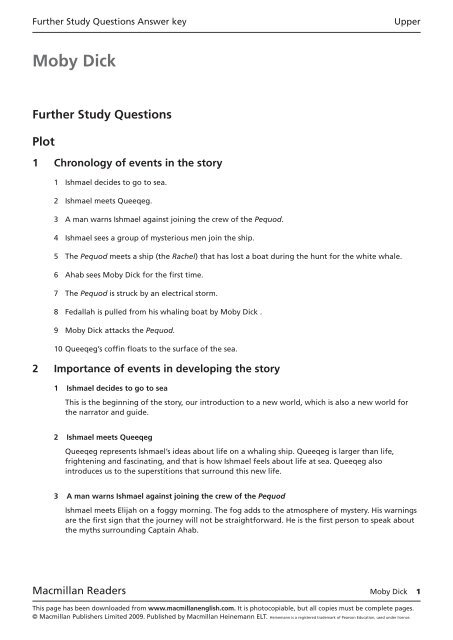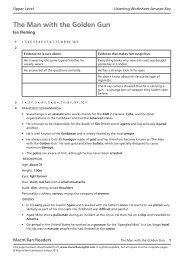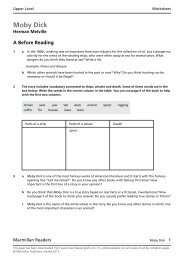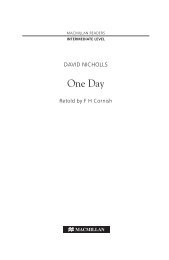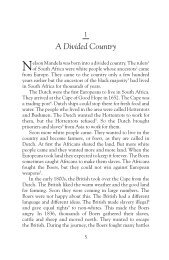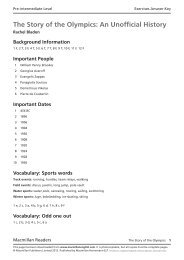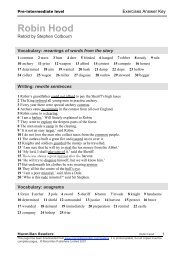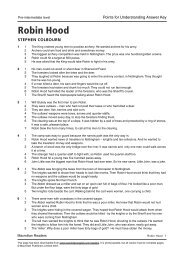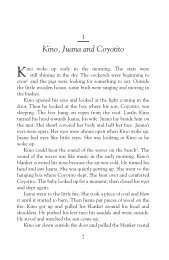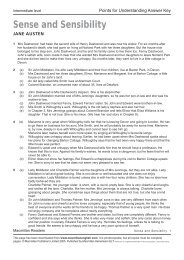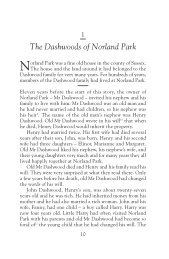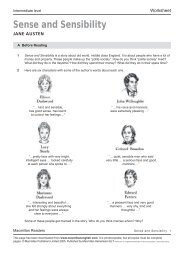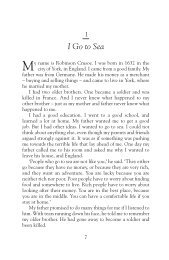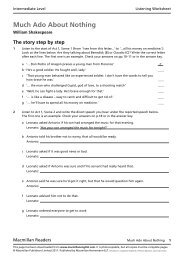Moby Dick Further Study Questions - Macmillan Readers
Moby Dick Further Study Questions - Macmillan Readers
Moby Dick Further Study Questions - Macmillan Readers
Create successful ePaper yourself
Turn your PDF publications into a flip-book with our unique Google optimized e-Paper software.
<strong>Further</strong> <strong>Study</strong> <strong>Questions</strong> Answer key Upper<br />
<strong>Moby</strong> <strong>Dick</strong><br />
<strong>Further</strong> <strong>Study</strong> <strong>Questions</strong><br />
Plot<br />
1 Chronology of events in the story<br />
1 Ishmael decides to go to sea.<br />
2 Ishmael meets Queeqeg.<br />
3 A man warns Ishmael against joining the crew of the Pequod.<br />
4 Ishmael sees a group of mysterious men join the ship.<br />
5 The Pequod meets a ship (the Rachel) that has lost a boat during the hunt for the white whale.<br />
6 Ahab sees <strong>Moby</strong> <strong>Dick</strong> for the first time.<br />
7 The Pequod is struck by an electrical storm.<br />
8 Fedallah is pulled from his whaling boat by <strong>Moby</strong> <strong>Dick</strong> .<br />
9 <strong>Moby</strong> <strong>Dick</strong> attacks the Pequod.<br />
10 Queeqeg’s coffin floats to the surface of the sea.<br />
2 Importance of events in developing the story<br />
1 Ishmael decides to go to sea<br />
This is the beginning of the story, our introduction to a new world, which is also a new world for<br />
the narrator and guide.<br />
2 Ishmael meets Queeqeg<br />
Queeqeg represents Ishmael’s ideas about life on a whaling ship. Queeqeg is larger than life,<br />
frightening and fascinating, and that is how Ishmael feels about life at sea. Queeqeg also<br />
introduces us to the superstitions that surround this new life.<br />
3 A man warns Ishmael against joining the crew of the Pequod<br />
Ishmael meets Elijah on a foggy morning. The fog adds to the atmosphere of mystery. His warnings<br />
are the first sign that the journey will not be straightforward. He is the first person to speak about<br />
the myths surrounding Captain Ahab.<br />
<strong>Macmillan</strong> <strong>Readers</strong> <strong>Moby</strong> <strong>Dick</strong> 1<br />
This page has been downloaded from www.macmillanenglish.com. It is photocopiable, but all copies must be complete pages.<br />
© <strong>Macmillan</strong> Publishers Limited 2009. Published by <strong>Macmillan</strong> Heinemann ELT. Heinemann is a registered trademark of Pearson Education, used under licence.
<strong>Further</strong> <strong>Study</strong> <strong>Questions</strong> Answer key Upper<br />
4 Ishmael sees a group of mysterious men join the ship<br />
These ghostly figures also add to the atmosphere of mystery and of supernatural forces surrounding<br />
the Pequod.<br />
5 The Pequod meets a ship (the Rachel) that has lost a boat during the hunt for the white whale<br />
The boat is a reminder of the dangers of hunting <strong>Moby</strong> <strong>Dick</strong>. But Ahab is too obsessed to pay any<br />
attention to the warnings or to stop and help the captain find his missing son.<br />
6 Ahab sees <strong>Moby</strong> <strong>Dick</strong> for the first time<br />
The captain had offered a reward to the first seaman to see <strong>Moby</strong> <strong>Dick</strong>, but Ahab sees him first. This<br />
seems right because the hunt for the great white whale is very personal to Ahab, it is about one<br />
man’s search for revenge.<br />
7 The Pequod is struck by an electrical storm<br />
The crew of the Pequod are terrified by the storm. They see it as a sign that the journey is cursed.<br />
The storm is coming from the east, where <strong>Moby</strong> <strong>Dick</strong> is. The men want to turn round and go home<br />
but Captain Ahab stands up to the storm. His crew do not know who they are more afraid of, Ahab<br />
or the storm. But Ahab beats the storm. From this point there is no turning back. Ahab has shown<br />
how determined he is.<br />
8 Fedallah is pulled from his whaling boat by <strong>Moby</strong> <strong>Dick</strong><br />
In their second attempt to catch <strong>Moby</strong> <strong>Dick</strong>, Fedallah was caught up in Ahab’s line and pulled out of<br />
his boat and to his death. So the first part of Fedallah’s prophecy came true. He had said he would<br />
die before Ahab.<br />
9 <strong>Moby</strong> <strong>Dick</strong> attacks the Pequod<br />
Ahab’s whaling boat is the only one left in the water, but instead of attacking Ahab, <strong>Moby</strong> <strong>Dick</strong><br />
attacks the Pequod. He breaks a hole in its side and the ship sinks with the whole crew. The current<br />
created by the ship as it sinks pulls the last whale boat and the rowers down under the water with<br />
it. Only Ishmael survived.<br />
10 Queeqeg’s coffin floats to the surface of the sea<br />
The only thing that remains of the ship once it has sunk is Queeqeg’s coffin. Ironically, the coffin<br />
saves Ishmael from the sharks until he is eventually picked up by the Rachel as she continues her<br />
search for her missing whaling boat.<br />
3 The role of prophecies in <strong>Moby</strong> <strong>Dick</strong><br />
1 “Any man who sails on that ship will never return.” (p 20)<br />
Elijah: This prophecy almost comes true; Ishmael is the only man to survive the voyage.<br />
2 “Beware of the white whale! … Think of your whaleboats, holed and sunk! Think about<br />
your men, lost or drowned!” (p 37l)<br />
<strong>Macmillan</strong> <strong>Readers</strong> <strong>Moby</strong> <strong>Dick</strong> 2<br />
This page has been downloaded from www.macmillanenglish.com. It is photocopiable, but all copies must be complete pages.<br />
© <strong>Macmillan</strong> Publishers Limited 2009. Published by <strong>Macmillan</strong> Heinemann ELT. Heinemann is a registered trademark of Pearson Education, used under licence.
<strong>Further</strong> <strong>Study</strong> <strong>Questions</strong> Answer key Upper<br />
Gabriel: This prophecy is fulfilled. By the end of the journey all the whaleboats will have been holed<br />
and/or sunk; most of the men will have been lost or drowned.<br />
3 “You won’t die until you have seen two hearses on the sea …the first hearse will not be made by<br />
human hands. The second will be made from a tree that was grown in America.” (p65)<br />
Fedallah: This prophecy is fulfilled. The first hearse is a prophecy of his own death; the second<br />
hearse will be the Pequod when it sinks and takes the crew with it.<br />
4 “I shall die first and show you the way.” (p65)<br />
Fedallah: This prophecy is also fulfilled – Fedallah dies before Ahab.<br />
5 “I shall not die before I kill <strong>Moby</strong> <strong>Dick</strong>!” (p65)<br />
Ahab: His prophecy does not come true as Ahab dies and the whale lives.<br />
6 “And only rope can kill you old man.” (p 65)<br />
Fedallah: This prophecy also comes true. Ahab dies when his harpoon rope wraps around his neck<br />
and pulls him into the sea.<br />
4 Ships’ importance in telling us about the business of whaling and the hunt for <strong>Moby</strong> <strong>Dick</strong><br />
The Albatross<br />
Unlike the Pequod, which is just setting out on its journey, the Albatross had been at sea for a long<br />
time and is on its way home. The condition of the ship and the seamen give an idea of what lies ahead.<br />
a The Albatross makes clear the hardship of life aboard a whaling ship.<br />
b The two ships do not communicate with each other and no information is exchanged about<br />
<strong>Moby</strong> <strong>Dick</strong>.<br />
The Jeroboam<br />
The crew and captain of the Jeroboam are superstitious. Gabriel, an old seaman who seems to have<br />
lost his mind, never leaves the ship as the captain thinks that would bring bad luck.<br />
a The Jeroboam highlights the superstitious nature of sailors, and illustrates another danger of life at<br />
sea: illness and the quick spread of diseases.<br />
b The captain tells a tale about how <strong>Moby</strong> <strong>Dick</strong> singled out and attacked a whaler, hitting him<br />
with his tail and sending him flying to his death. The story helps to add to the myth and legend<br />
surrounding the whale.<br />
The Jungfrau<br />
The German ship has had no luck on its journey so far. It has caught no whales and it has run out of oil.<br />
a The encounter shows that the whaling ships had a strange relationship. They were quick to help<br />
each other in trouble, but were also competing for the same whales. In the description of the race<br />
for the old blind whale, many details of the mechanics of whaling are described, as is the fact that<br />
the whalers often worked hard to catch a whale only to find themselves having to let it go to save<br />
their ship.<br />
b The German ship had not heard about <strong>Moby</strong> <strong>Dick</strong> and no information is exchanged about the<br />
whale.<br />
<strong>Macmillan</strong> <strong>Readers</strong> <strong>Moby</strong> <strong>Dick</strong> 3<br />
This page has been downloaded from www.macmillanenglish.com. It is photocopiable, but all copies must be complete pages.<br />
© <strong>Macmillan</strong> Publishers Limited 2009. Published by <strong>Macmillan</strong> Heinemann ELT. Heinemann is a registered trademark of Pearson Education, used under licence.
<strong>Further</strong> <strong>Study</strong> <strong>Questions</strong> Answer key Upper<br />
The Rose-bud<br />
The captain of the Rose-bud is inexperienced and doesn’t realise that dead whales don’t contain any<br />
useful supplies of oil. He is insisting that the men put up with the terrible smell and try to extract oil<br />
just the same. The seamen are sick of the smell and want to get rid of the whale, but the captain will<br />
not listen to reason (in this way he is similar to Ahab, an unreasonable captain that pushes his crew<br />
into suffering conditions they are not happy with).<br />
a The encounter teaches us a lot about the products of whaling, about the competitive nature of the<br />
job and about how important experience is.<br />
b The French sailors have not heard of <strong>Moby</strong> <strong>Dick</strong> and no information is exchanged.<br />
The Samuel Enderby<br />
The captain of the Samuel Enderby contrasts strongly with Ahab. Both men have lost limbs because of<br />
the white whale, but their attitude to their loss is completely different. The Englishman doesn’t want<br />
revenge, he is glad that he escaped with his life and is not interested in hunting <strong>Moby</strong> <strong>Dick</strong> any more.<br />
He thinks that Ahab is mad to go after him.<br />
a The encounter doesn’t really teach us anything new about whaling ships, except that it is a hard<br />
life, with ships’ doctors treating patients in extreme circumstances.<br />
b The English captain describes <strong>Moby</strong> <strong>Dick</strong> as an enormous whale, bigger than any other whale he’s<br />
ever seen, strong and impossible to catch as well as dangerous to hunt. He says that <strong>Moby</strong> <strong>Dick</strong><br />
plans his attacks on ships. The story adds to the myth growing around the figure of the whale.<br />
The Bachelor<br />
The crew of the Bachelor, including the captain, are all celebrating their good luck. They are singing<br />
and dancing and drinking. Their journey has been very successful and they will soon be home. This is<br />
how life could be for the seamen on the Pequod if their captain was not so obsessed with chasing the<br />
white whale. This is the happy return home that they will never see.<br />
a We learn about the importance of taking home as much sperm oil as possible, the custom of picking<br />
up islanders from Polynesia and the festive atmosphere of a successful journey.<br />
b The captain has heard of the white whale but he has not seen him, and doesn’t want to. This<br />
attitude may be part of the ship’s good luck. They are not interested in myth or superstition, only in<br />
finishing their job and getting home to celebrate.<br />
The Rachel<br />
The Rachel has seen <strong>Moby</strong> <strong>Dick</strong> the day before. The crew need Ahab’s help, but he is too obsessed with<br />
the idea of chasing <strong>Moby</strong> <strong>Dick</strong> to stop.<br />
a More details about the dangerous work of whaling, of how ships get lost and the story of the<br />
captain’s boy shows us how this hard, dangerous life is shared by boys as young as 12 years old.<br />
b The whale is getting nearer and more real, and so is the danger. The boat that chased <strong>Moby</strong> <strong>Dick</strong><br />
has been lost. There’s no clue as to what might have happened to it. The suspense and thrill of the<br />
chase, and the general sense of urgency, is growing.<br />
<strong>Macmillan</strong> <strong>Readers</strong> <strong>Moby</strong> <strong>Dick</strong> 4<br />
This page has been downloaded from www.macmillanenglish.com. It is photocopiable, but all copies must be complete pages.<br />
© <strong>Macmillan</strong> Publishers Limited 2009. Published by <strong>Macmillan</strong> Heinemann ELT. Heinemann is a registered trademark of Pearson Education, used under licence.
<strong>Further</strong> <strong>Study</strong> <strong>Questions</strong> Answer key Upper<br />
The Delight<br />
As the Pequod gets nearer to the whale they see more evidence of its destructive power. But the<br />
warnings just make Ahab more anxious to catch up with <strong>Moby</strong> <strong>Dick</strong>.<br />
a The burial at sea is yet another example of the hard reality of life at sea.<br />
b The captain’s tale is very simple; the broken whale boat and the burial show how powerful the<br />
whale is.<br />
Essay question<br />
u<br />
See ANSWER KEY – p108 OF READER<br />
<strong>Moby</strong> <strong>Dick</strong> is a sea adventure. Discuss how prophecies, superstition (a belief in the<br />
power of magic and luck) and stories told by other whalers add to the mystery and<br />
suspense of the plot.<br />
Sample essay<br />
You will find notes on how to answer this question, and a sample essay in Model essays.<br />
ChArACTErS<br />
1 Analysis of three main characters<br />
Ahab’s driving obsession with the white whale and his willingness to sacrifice everything in order to kill<br />
it, his ability to motivate his whalers to join the hunt with enthusiasm and the glimpses of his quieter,<br />
sadder side make Ahab a fascinating character.<br />
Ishmael is interesting because he provides us with a way in to this strange world. He is a bridge<br />
between the ‘real world’ and the world of the whaling ships. He sees things with new eyes and<br />
explains the routines and rituals to us. This makes him interesting.<br />
<strong>Moby</strong> <strong>Dick</strong> is most interesting because of the questions he raises. Is he really seeking revenge? Or is<br />
this just a projection of human motives on to an animal? What does <strong>Moby</strong> <strong>Dick</strong> represent? Does he<br />
represent the power of nature? Is he evil, is he good? Is he beyond good and evil because these are<br />
human concepts? All these questions make <strong>Moby</strong> <strong>Dick</strong> a very interesting character and help us explore<br />
the layers of meaning in the novel.<br />
It is up to you to decide which character you find most interesting – choose a character and<br />
then explain why you have made that choice.<br />
<strong>Macmillan</strong> <strong>Readers</strong> <strong>Moby</strong> <strong>Dick</strong> 5<br />
This page has been downloaded from www.macmillanenglish.com. It is photocopiable, but all copies must be complete pages.<br />
© <strong>Macmillan</strong> Publishers Limited 2009. Published by <strong>Macmillan</strong> Heinemann ELT. Heinemann is a registered trademark of Pearson Education, used under licence.
<strong>Further</strong> <strong>Study</strong> <strong>Questions</strong> Answer key Upper<br />
Ahab<br />
2 Describing Ahab<br />
Mad: Ahab is not clinically insane. He is fully aware of the consequences of his decisions, but he is<br />
driven. Sometimes he seems to want to stop the hunt but can’t. However, he is lucid and intelligent,<br />
although his decisions may be described as ‘crazy’.<br />
Superstitious: Ahab shows his superstition on more than one occasion, especially surrounding<br />
his harpoon: he asks his harpooners to cool the harpoon with their blood; he baptises it with fire<br />
during the typhoon; he insists on choosing his own team for his whaling boat and listens carefully to<br />
Fedallah’s prophecies.<br />
Charismatic: Ahab is very charismatic. He succeeds in filling his crew with enthusiasm for the hunt.<br />
Even though they think he is crazy, they are willing to follow him. At one point he realises that he<br />
could damage his relationships with the crew if he pushes them too far. They want to stop to repair<br />
the oil barrels; he wants to continue the hunt. He senses the danger of insisting on having his own<br />
way, and, for once, puts the crew’s feelings before his own.<br />
Obsessed: He only thinks about the whale. Every conversation he has with every passing ship is about<br />
<strong>Moby</strong> <strong>Dick</strong>. During these conversations he is only interested in finding out where the whale is and<br />
where he’s heading. He does not stop to help the Rachel even though he knows the captain personally.<br />
He dreams about the whale, but he also dreams about his own death. Hunting the whale is more<br />
important to him than anything else in his life, more important than his own life.<br />
Other possible adjectives to describe Ahab: stubborn, selfish, tortured, revengeful, destructive,<br />
single-minded, strong-willed.<br />
3 Ahab’s character within the book<br />
Is Ahab a good captain? Does he look after his boat and crew? Does he think about the needs of<br />
other boats at sea?<br />
He is an efficient and effective captain. His crew obey and respect him. The whaling boat functions<br />
efficiently and the crew seem content. In this way he is a good captain. But he is willing to put his<br />
men and his boat in danger in order to get his revenge on the whale. Even when Fedallah is killed in<br />
the hunt, he does not stop. On more than one occasion he is asked to help other ships, but he refuses,<br />
because he can only think about <strong>Moby</strong> <strong>Dick</strong>. In this way, he is not a good captain.<br />
Is he a good leader of men? How does he persuade the whalers to help him hunt down <strong>Moby</strong> <strong>Dick</strong>?<br />
Think about how he uses the sailors’ fears and superstitions.<br />
Ahab knows how to motivate his crew. Early in the voyage he calls all the crew on deck and he explains<br />
the purpose of the voyage. He first uses competition to motivate and get them interested in <strong>Moby</strong><br />
<strong>Dick</strong>. He hammers a gold coin to the mast. The first sailor to see the white whale will win the coin. He<br />
then explains the reason for the hunt and calls on his crew to support him:<br />
‘To chase that white whale all over the earth until he spouts black blood and dies. Will you do<br />
that?’<br />
‘Yes, yes,’ shouted the harpooners. ‘Death to <strong>Moby</strong> <strong>Dick</strong>! Death to <strong>Moby</strong> <strong>Dick</strong>!’<br />
<strong>Macmillan</strong> <strong>Readers</strong> <strong>Moby</strong> <strong>Dick</strong> 6<br />
This page has been downloaded from www.macmillanenglish.com. It is photocopiable, but all copies must be complete pages.<br />
© <strong>Macmillan</strong> Publishers Limited 2009. Published by <strong>Macmillan</strong> Heinemann ELT. Heinemann is a registered trademark of Pearson Education, used under licence.
<strong>Further</strong> <strong>Study</strong> <strong>Questions</strong> Answer key Upper<br />
Later he plays on their superstitions and fears. When the ship is caught in a typhoon, Starbuck thinks<br />
the ship is cursed and wants to turn for home. But Ahab quickly takes control of the situation. He<br />
shows the men that he is stronger than the storm, and the men’s fear is turned from the storm to him.<br />
They quickly and quietly go back to their positions.<br />
Does Ahab have to die? What would he have done with the rest of his life if he had succeeded in<br />
killing <strong>Moby</strong> <strong>Dick</strong>?<br />
Ahab’s need for revenge is his fatal flaw, the weakness in his character that will eventually destroy<br />
him. Whether we believe in the superstitions or not, the logic and rhythm of the story, powered by<br />
Fedallah’s prophecies, seem to make Ahab’s death inevitable. As each part of Fedallah’s prophecy,<br />
including his own death, comes true, the feeling that Ahab cannot survive the chase becomes stronger.<br />
It is almost impossible to imagine what Ahab would have done if he had killed <strong>Moby</strong> <strong>Dick</strong>. Would he<br />
have been able to sail quietly home to Nantucket and live a quiet life without the excitement and<br />
the obsession of the chase? Maybe he would have retired, spent some time with his family, telling his<br />
stories of the great white whale until he grew old and grey.<br />
Why is killing <strong>Moby</strong> <strong>Dick</strong> so important to Ahab?<br />
We aren’t given an answer to this question. We only know that killing <strong>Moby</strong> <strong>Dick</strong> is more important to<br />
him than anything else:<br />
‘I’ll kill you, even if it takes the last breath in my body!’<br />
It is as if <strong>Moby</strong> <strong>Dick</strong> has challenged him by taking his leg, and he cannot ignore the challenge. It is also<br />
part of Ahab’s character, he ‘can’t stop until it’s finished’.<br />
<strong>Moby</strong> <strong>Dick</strong><br />
4 More than just a whale<br />
What do we know about the great white whale?<br />
He is infamous amongst whalers and there are many stories told about him, ‘some true and some<br />
imagined’. Some say that he is the biggest sperm whale they’ve ever seen.<br />
He isn’t actually all white, only his hump and his head are white. And he’s got ‘a great white spout that<br />
sends water high into the sky’. There are three or more harpoons stuck in him. Ahab claims that they<br />
are his. Many men died trying to catch him and various stories tell how he attacked whaling boats and<br />
harpooners that were chasing him, using his tail, biting and surfacing under boats.<br />
<strong>Moby</strong> <strong>Dick</strong> bit off Ahab’s leg in a previous meeting, when the captain jumped on the whale’s back and<br />
attacked him with a knife. <strong>Moby</strong> <strong>Dick</strong> also once knocked a harpooner who was shouting wildly at him<br />
out of his ship with his tail. The harpooner was never seen again.<br />
Who gives us the information?<br />
The crew of the Pequod, Captain Ahab, other whalers, the crew and captains of whaling ships the<br />
Pequod meets on her voyage, both directly and through Ishmael’s narration.<br />
Is the whale trying to kill Ahab?<br />
Many of the stories describe how <strong>Moby</strong> <strong>Dick</strong> turns back to attack the ships and boats that are chasing<br />
him. It is not unusual for a hunted animal to defend itself by attacking and, when they attack, they are<br />
dangerous and ready to kill.<br />
<strong>Macmillan</strong> <strong>Readers</strong> <strong>Moby</strong> <strong>Dick</strong> 7<br />
This page has been downloaded from www.macmillanenglish.com. It is photocopiable, but all copies must be complete pages.<br />
© <strong>Macmillan</strong> Publishers Limited 2009. Published by <strong>Macmillan</strong> Heinemann ELT. Heinemann is a registered trademark of Pearson Education, used under licence.
<strong>Further</strong> <strong>Study</strong> <strong>Questions</strong> Answer key Upper<br />
I would argue that <strong>Moby</strong> <strong>Dick</strong> is not deliberately setting out to kill Ahab. We see evidence of this in<br />
the final three-day battle. Although on the first day the whale does attack Ahab’s boat, he does not<br />
attack the captain once he is in the water, but swims away. On the second day of the final battle when<br />
Fedallah is killed, <strong>Moby</strong> <strong>Dick</strong> again sends Ahab and his whaling boat crashing into the water. Ahab is<br />
left floating in the water for some time, but <strong>Moby</strong> <strong>Dick</strong> does not attack him.<br />
On the third day, <strong>Moby</strong> <strong>Dick</strong> first attacks the other two whaling boats, but leaves Ahab’s alone.<br />
Starbuck begs Ahab to give up the hunt:<br />
“It’s not too late to stop the hunt! Look how <strong>Moby</strong> <strong>Dick</strong> swims away from you. It is you who<br />
look for him, not he who looks for you. Let him go, sir!”<br />
What does the whale represent?<br />
It has been suggested that <strong>Moby</strong> <strong>Dick</strong> represents God, evil, fate and the power of nature. He is seen<br />
as all-powerful and god-like. He is described as destructive and aggressive, attacking whaling boats<br />
and killing whalers, and so he might be seen to represent evil. If we see Ahab’s death as inevitable,<br />
then <strong>Moby</strong> <strong>Dick</strong> is a symbol of Ahab’s tragic fate: to die at his own hands (or by his own rope) killed by<br />
his obsessive need for revenge. <strong>Moby</strong> <strong>Dick</strong> can also be seen as a symbol of the power of nature, and<br />
Ahab’s hunt as man’s obsessive need to control and overcome the powers of nature.<br />
Ishmael<br />
5 Ishmael’s character<br />
What do we know about Ishmael and his past life? Why does he decide to go whaling?<br />
We know very little about Ishmael’s past life. We know that he has been to sea before and that he<br />
chooses to go to sea when he is feeling irritable and bad-tempered and because there is nothing on<br />
shore to interest him. He chooses to be a sailor because he cannot afford to be a passenger, but he<br />
doesn’t want to be a captain because ‘I do not want to be responsible for other men’. He is fascinated<br />
by whales and whaling ships and it is his dream to hunt and catch a whale.<br />
Ishmael tells the story of <strong>Moby</strong> <strong>Dick</strong>. Can we trust his descriptions of events and people? Why/why<br />
not?<br />
On the surface, Ishmael seems to be a fairly reliable narrator. He describes scenes and actions in<br />
detail and does not pass judgement on the characters he describes. But his narration is a first person<br />
narrative, and therefore is subjective.<br />
As a character in the novel, he is simply one of the crew, yet he escapes the common fate that awaits<br />
the whole crew, the ship and its captain. He is the only survivor and this affects his narration. He<br />
is telling the story with hindsight. He knows what happens at the end of the hunt, and the whole<br />
rhythm, pace and shape of his narrative is influenced by this.<br />
We have to question his reliability when he narrates events that he never actually witnessed, for<br />
example, when Starbuck picks up Ahab’s gun and considers the possibility of killing the captain and<br />
rescuing the crew from their fate.<br />
<strong>Macmillan</strong> <strong>Readers</strong> <strong>Moby</strong> <strong>Dick</strong> 8<br />
This page has been downloaded from www.macmillanenglish.com. It is photocopiable, but all copies must be complete pages.<br />
© <strong>Macmillan</strong> Publishers Limited 2009. Published by <strong>Macmillan</strong> Heinemann ELT. Heinemann is a registered trademark of Pearson Education, used under licence.
<strong>Further</strong> <strong>Study</strong> <strong>Questions</strong> Answer key Upper<br />
Imagine Ahab is the survivor, not Ishmael. In what way would the story be different?<br />
If Ahab were the narrator, there would be much less information about the day-to-day life on board<br />
the ship, about the sailors’ thoughts and fears about the mechanics of whaling. His narration would be<br />
about <strong>Moby</strong> <strong>Dick</strong>, about the whale’s habits, where he usually swam, what he ate, what signs showed<br />
him that he was getting nearer. It might also include details about his dreams of coffins and hearses,<br />
his thoughts on Fedallah and his prophecies and his ideas about how to motivate his crew. From a<br />
practical point of view, it would have to be told in the form of a ship’s log, or a journal, to be found<br />
floating on the sea by the Rachel, once the Pequod had sunk.<br />
Essay question<br />
Discuss the character of Ahab. He is stubborn, selfish, revengeful and<br />
destructive, but there are times when we feel pity for him. Explore both<br />
sides of the man, his obsession and his humanity.<br />
Sample essay<br />
You will find notes on how to answer this question, and a sample essay in Model essays.<br />
Themes<br />
The whaling industry<br />
1 What we learn from the novel<br />
Sperm whales<br />
We learn that sperm whales at the time were plentiful, and that they often swam together in great<br />
schools in the Pacific Ocean and the waters around Japan. Their oil was very valuable and there was a<br />
strong sense of competition between the whaling ships.<br />
Sperm oil<br />
We do not learn a lot about sperm oil, but it was obviously a very valuable commodity and would earn<br />
the crew a lot of money once on shore.<br />
Ambergris<br />
Ambergris is very valuable because it is very rare. It is a thick white substance which is found in the<br />
stomachs of sick whales. It is not known whether ambergris causes – or is caused by – that sickness. It is<br />
used to make perfumes and candles and can also be used for cooking.<br />
The process of hunting a whale<br />
We learn that the whaling ships carried smaller boats that were lowered from the ship to chase the<br />
whales. The harpooners travelled on these boats and threw their harpoons at the whales. There was a<br />
rope at the end of the harpoon and the whalers used this to pull in the whale, and once it was within<br />
reach they killed it. The whale was then dragged to the ship and lifted onto the side.<br />
<strong>Macmillan</strong> <strong>Readers</strong> <strong>Moby</strong> <strong>Dick</strong> 9<br />
This page has been downloaded from www.macmillanenglish.com. It is photocopiable, but all copies must be complete pages.<br />
© <strong>Macmillan</strong> Publishers Limited 2009. Published by <strong>Macmillan</strong> Heinemann ELT. Heinemann is a registered trademark of Pearson Education, used under licence.
<strong>Further</strong> <strong>Study</strong> <strong>Questions</strong> Answer key Upper<br />
The crew of a whaling ship and their various tasks<br />
The crew of a whaling ship was made up of a number of different members. Some crew members were<br />
responsible for sailing the ship; some also rowed the smaller whaling boats. Each whaling boat had its<br />
own crew, with its own captain and a harpooner. There were carpenters to repair any damage to the<br />
boats and to build barrels to hold the oil as well as other wooden objects, and there were blacksmiths<br />
who made the harpoons and the other weapons. Although there were many levels of command – chief<br />
mates, second mates, third mates, and so on – the whole crew worked closely together, sharing the<br />
tasks and living together in very close quarters (close together). One of the most important tasks was<br />
that of the lookouts who climbed the ship’s masts to keep a lookout for whales. The same men who<br />
hunted the whales were responsible for collecting and storing the oil.<br />
2 Working on a whaling ship in the 19 th century<br />
This is a subjective question and there is no right or wrong answer. Here is an example of what you<br />
might write in answer to this question.<br />
It would have been a very hard life. Ships would set sail on three-year voyages, making only very<br />
brief stops to restock. Life onboard was uncomfortable and dangerous. Crews sailed in all kinds of<br />
conditions, and faced storms and pirates as well as the dangers of whaling. Men and whaling boats<br />
were often lost in the hunt and if you didn’t die in an accident there was the possibility of dying of a<br />
tropical disease. However, it could be very profitable if the whaling went well.<br />
revenge<br />
3 Ahab’s lust for revenge<br />
Do you think it is understandable for Ahab to want revenge?<br />
Considering the loss of his leg, it is possible to argue that Ahab’s desire for revenge on <strong>Moby</strong> <strong>Dick</strong> is<br />
understandable. However, whilst this may be a reason for his revenge, it is not an excuse. We would<br />
never consider the idea of revenge on an animal to be reasonable, as his lust for retribution is not<br />
justifiable or rational – even if <strong>Moby</strong> <strong>Dick</strong> were a human being, the fact is that Ahab has hunted him,<br />
several times, and that the whale is acting to defend itself, not to punish its hunters. Ahab himself<br />
does not explain the reasons for his feelings so we can only speculate as to his reasoning. Perhaps it is<br />
Ahab’s pride that has been wounded; Ahab tells Starbuck that he has been whaling for 40 years – we<br />
can speculate that this may be the first whale that had succeeded in fighting back?<br />
What price does Ahab pay for his revenge?<br />
His own death, the death of his crew and the sinking of his ship.<br />
What does Ahab’s obsession with <strong>Moby</strong> <strong>Dick</strong> tell us about the nature of revenge?<br />
That it is destructive and that we can never know what the consequences might be.<br />
<strong>Macmillan</strong> <strong>Readers</strong> <strong>Moby</strong> <strong>Dick</strong> 10<br />
This page has been downloaded from www.macmillanenglish.com. It is photocopiable, but all copies must be complete pages.<br />
© <strong>Macmillan</strong> Publishers Limited 2009. Published by <strong>Macmillan</strong> Heinemann ELT. Heinemann is a registered trademark of Pearson Education, used under licence.
<strong>Further</strong> <strong>Study</strong> <strong>Questions</strong> Answer key Upper<br />
Superstition<br />
4 The great squid<br />
“The dead body of a great squid,” said Starbuck. “Very few whaling ships see one and return<br />
home to tell anyone about it.”<br />
“When you see a squid,” he told me as he pointed his harpoon toward the sea, “you’ll soon<br />
see a sperm whale.”<br />
The first statement is based on superstition, the second on fact, as sperm whales are known to feed on<br />
giant squid.<br />
5 ‘Signs’<br />
The typhoon (pp66–69)<br />
When the typhoon first hits the ship and damages Ahab’s whaling boat, Starbuck blames the storm on<br />
<strong>Moby</strong> <strong>Dick</strong>. Then, when the masts light up with ‘flames’, Starbuck sees another bad omen, while Stubb<br />
tries to fight his fear and claims that it is a good sign, but Ahab claims that the ‘white flame lights the<br />
way to the white whale’.<br />
When Ahab’s harpoon lights up with the strange white flames, Starbuck sees this as a sign that the<br />
voyage is cursed. He calls to the captain and the crew to put up new sails and head for home. The crew<br />
are ready to follow his orders but Ahab picks up the harpoon and blows away the flame, trying, at the<br />
same time, to blow away his crew’s fears.<br />
The crew are not happy but they return to their work, Ishmael speaks for the whole crew as he sums<br />
up their horror and amazement at what they have just seen:<br />
‘For a moment, we could not move. Then with terror in our eyes, we quickly went away from<br />
him. We could not believe what we had seen.’<br />
The sound of seals calling to their young (pp70–72)<br />
Some of the crew say that they are mermaids; the oldest member of the crew says that they are the<br />
voices of the ghosts of newly-drowned sailors. They do not look for a rational explanation. Ahab<br />
explains that they were probably the sound of seals calling their young. This doesn’t help. The sailors<br />
believe that seals bring bad luck and blame them when a lookout falls from the mast and dies. Ishmael<br />
also believes in the superstitions:<br />
‘It was the seals that had brought us this piece of bad luck, not <strong>Moby</strong> <strong>Dick</strong>—that’s what we<br />
told each other.’<br />
<strong>Macmillan</strong> <strong>Readers</strong> <strong>Moby</strong> <strong>Dick</strong> 11<br />
This page has been downloaded from www.macmillanenglish.com. It is photocopiable, but all copies must be complete pages.<br />
© <strong>Macmillan</strong> Publishers Limited 2009. Published by <strong>Macmillan</strong> Heinemann ELT. Heinemann is a registered trademark of Pearson Education, used under licence.
<strong>Further</strong> <strong>Study</strong> <strong>Questions</strong> Answer key Upper<br />
6 The power of superstitions<br />
As the ship gets close to <strong>Moby</strong> <strong>Dick</strong>, superstitions seem to become more important to Ishmael and<br />
the other sailors than fact. Discuss why this happens and what it tells us about the sailors and their<br />
feelings about the hunt.<br />
In the first part of the voyage, Ishmael is fascinated by all the details of life aboard a whaling ship. He<br />
describes the first chases and the process of whaling in detail. He brings the strange world of the ship<br />
to life for us, and creates a solid background for the story to come. But, once the hunt is announced,<br />
and as Ahab becomes more and more anxious in his search for the whale, so the narration begins to<br />
focus more on the suspense. The superstitions promise bad luck, but Ahab pushes the ship forward.<br />
He no longer has time for anything but the hunt. His obsession is infectious, and the crew get caught<br />
up in his enthusiasm. But the stories they hear from other ships warn of the dangers ahead, and this<br />
is magnified by the sailors’ superstitions. Ishmael no longer describes the routine aboard ship; he<br />
concentrates wholly on the hunt.<br />
Essay questions<br />
As well as an amazing story about an amazing adventure, <strong>Moby</strong> <strong>Dick</strong> is also a<br />
record of life aboard a whaling ship in the mid 19 th century. What do we learn<br />
about the whaling industry from the novel?<br />
Discuss how Ishmael gradually introduces us to the world of Captain Ahab<br />
and the great white whale. How are other people’s descriptions and<br />
stories are used to introduce the characters long before they make a direct<br />
appearance?<br />
Discuss the great white whale. What does <strong>Moby</strong> <strong>Dick</strong> represent? In what<br />
ways does the whale represent different things to different people? Think<br />
about the crew of the Pequod, and the captains and crews of other ships<br />
they meet on their voyage.<br />
Sample essay<br />
You will find notes on how to answer this question, and a sample essay in Model essays.<br />
<strong>Macmillan</strong> <strong>Readers</strong> <strong>Moby</strong> <strong>Dick</strong> 12<br />
This page has been downloaded from www.macmillanenglish.com. It is photocopiable, but all copies must be complete pages.<br />
© <strong>Macmillan</strong> Publishers Limited 2009. Published by <strong>Macmillan</strong> Heinemann ELT. Heinemann is a registered trademark of Pearson Education, used under licence.


